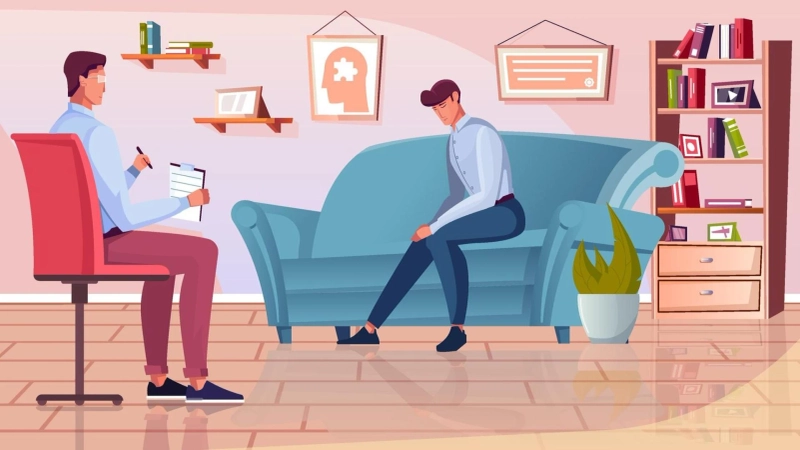Anxiety is a common experience for many people. It can range from feeling a little nervous before a big event to experiencing a full-blown panic attack. However, for some individuals, anxiety can be overwhelming, and persistent, and interfere with their daily life. This is when anxiety becomes a disorder.
Anxiety disorders are the most common mental health condition in the United States, affecting over 40 million adults annually. However, only 36.9% of those with an anxiety disorder receive treatment. In this article, we will discuss anxiety disorder treatment, including recognizing the signs, getting help, and what treatment options are available.
Recognizing the Signs of Anxiety Disorders
There are several types of anxiety disorders, each with unique symptoms. However, some common symptoms across all anxiety disorders include:
Excessive Worrying: Feeling worried or anxious most days and for prolonged periods.
Restlessness: Feeling restless, irritable, or on edge.
Fatigue: Feeling tired or fatigued even when you haven't done anything physically demanding.
Difficulty Concentrating: Finding it difficult to focus or concentrate on tasks.
Muscle Tension: Experiencing muscle tension, headaches, or body aches.
Sleep Disturbances: Having trouble falling or staying asleep or experiencing nightmares.
If you experience any of these symptoms, you may have an anxiety disorder. It is important to seek help from a mental health professional, who can diagnose your condition and recommend the best treatment options.
Getting Help for Anxiety Disorders
Many people with anxiety disorders do not seek help because they are unsure of where to start or are afraid of being judged. However, seeking help is crucial for managing anxiety disorders effectively. Here are some steps you can take to get help:
Talk to Your Doctor: Your primary care physician can assess your symptoms and refer you to a mental health professional if necessary.
Reach Out to a Mental Health Professional: A mental health professional, such as a psychologist or therapist, can diagnose and treat anxiety disorders.
Consider Medication: Medication can be used in combination with therapy to manage anxiety disorders effectively.
Try Therapy: Therapy is one of the most effective treatments for anxiety disorders. Cognitive-behavioral therapy (CBT) and exposure therapy are common types of therapy used to treat anxiety disorders.
Practice Self-Care: Taking care of yourself through exercise, relaxation techniques, and mindfulness can help manage anxiety symptoms.
Treatment Options for Anxiety Disorders
Anxiety disorders are treatable, and there are several treatment options available. Here are some of the most common treatment options:
Therapy: Therapy is a cornerstone of anxiety disorder treatment. CBT and exposure therapy are two of the most effective therapies for anxiety disorders.
Medication: Medications such as antidepressants, benzodiazepines, and beta-blockers are used to manage anxiety disorders.
Self-Care: Practicing self-care, such as exercise, relaxation techniques, and mindfulness, can help manage anxiety symptoms.
Support Groups: Joining a support group can help individuals with anxiety disorders connect with others who are going through similar experiences.
Conclusion
In conclusion, anxiety disorders are a common mental health condition that affects millions of people. It is essential to recognize the signs of anxiety disorders, including excessive worrying, restlessness, fatigue, difficulty concentrating, muscle tension, and sleep disturbances.
Getting help for anxiety disorders treatment is crucial for effective management. This can include talking to your doctor, reaching out to a mental health professional, considering medication, trying therapy, and practicing self-care.
Therapy, in particular, is a cornerstone of anxiety disorder treatment. Cognitive-behavioral therapy (CBT) and exposure therapy are two of the most effective therapies for anxiety disorders. Medications such as antidepressants, benzodiazepines, and beta-blockers can also be used to manage anxiety symptoms.
Self-care is another important aspect of anxiety disorder treatment. Practicing self-care, such as exercise, relaxation techniques, and mindfulness, can help individuals manage anxiety symptoms.
Finally, support groups can be beneficial for individuals with anxiety disorders. Joining a support group can help individuals connect with others who are going through similar experiences and provide a sense of community and understanding.
If you or someone you know is struggling with an anxiety disorder, do not hesitate to seek help from an experienced Sugar Land Psychiatrist. With the right treatment and support, individuals with anxiety disorders can live fulfilling lives. Remember that seeking help for mental health concerns is a sign of strength, and there is no shame in asking for help.



